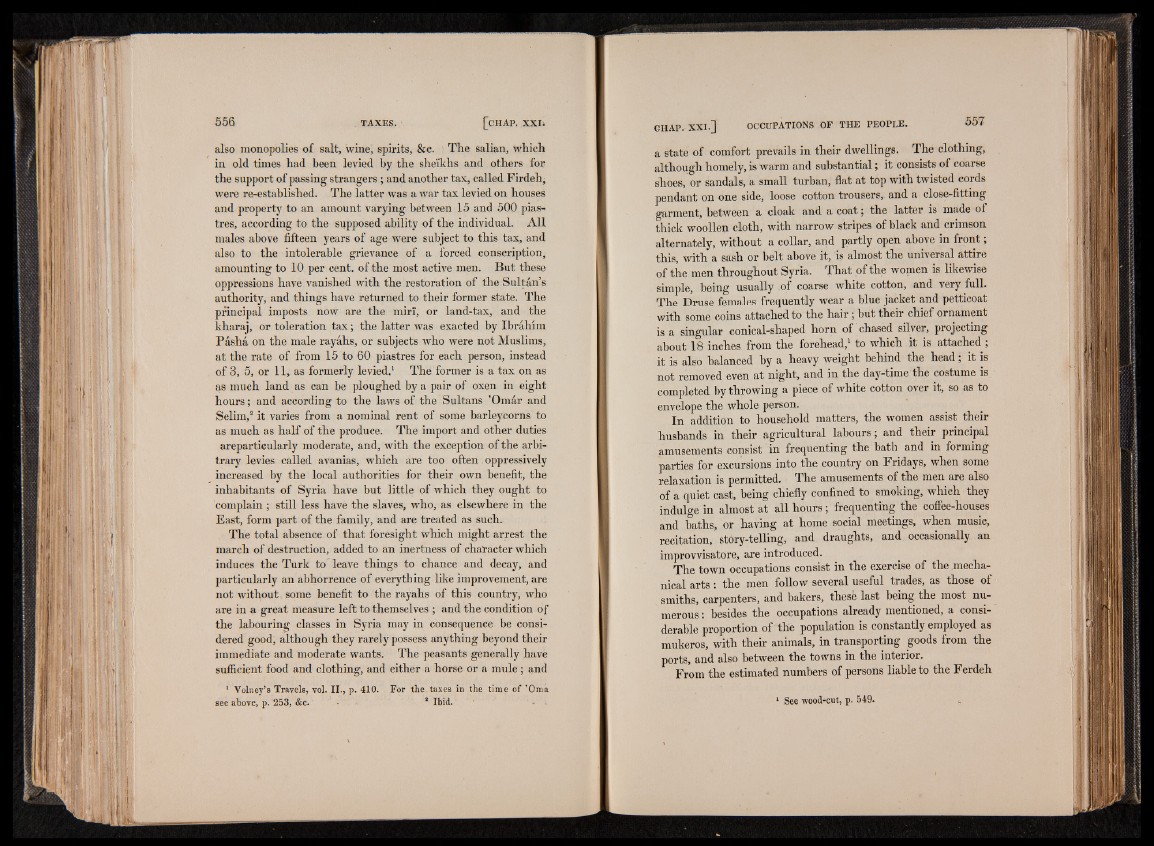
also monopolies of salt, wine, spirits, &c. The salian, which
in old times had been levied by the sheikhs and others for
the support of passing strangers ; and another tax, called Firdeh,
were re-established. The latter was a war tax levied on houses
and property to an amount varying between 15 and 500 piastres,
according to the supposed ability of the individual. All
males above fifteen years of age were subject to this tax, and
also to the intolerable grievance of a forced conscription^
amounting to 10 per cent, of the most active men. But these
oppressions have vanished with the restoration of the Sultan’s
authority, and things have returned to their former state. The
principal imposts now are the miri, or land-tax, and the
kharaj, or toleration tax; the latter was exacted by Ibrahim
Pasha on the male rayahs, or subjects who were not Muslims,
at the rate of from 15 to 60 piastres for each person, instead
of 3, 5, or 11, as formerly levied.1 The former is a tax on as
as much land as can be ploughed by a pair of oxen in eight
hours; and according to the laws of the Sultans ’Omar and
Selim,2 it varies from a nominal rent of some barleycorns to
as much as half of the produce. The import and other duties
areparticularly moderate, and, with the exception of the arbitrary
levies called avanias, which are too often oppressively
increased by the local authorities for their own benefit, the
inhabitants of Syria have but little of which they ought to
complain ; still less have the slaves, who, as elsewhere in the
East, form part of the family, and are treated as such.
The total absence, of that foresight which might arrest the
march of destruction, added to an inertness of character which
induces the Turk to leave things to chance and decay, and
particularly an abhorrence of everything like improvement, are
not without some benefit to the rayahs of this country, who
are in a great measure left to themselves ; and the condition of
the labouring classes in Syria may in consequence be considered
good, although they rarely possess anything beyond their
immediate and moderate wants. The peasants generally have
sufficient food and clothing, and either a horse or a mule; and
1 Volney’s Travels, vol. II., p. 410. For the taxes in the time of 'Oma
see ahove, p. 253, &c. - ‘ Ibid.
a state of comfort prevails in their dwellings. The clothing,
although homely, is warm and substantial; it consists of coarse
shoes, or sandals, a small turban, flat at top with twisted cords
pendant on one side, loose cotton trousers, and a close-fitting
garment, between a cloak and a coat 5 the latter is made of
thick woollen cloth, with narrow stripes of black and crimson
alternately, without a collar, and partly open above in front;
this, with a sash or belt above it, is almost the universal attire
of the men throughout Syria. That of the women is likewise
simple, being usually of coarse white cotton, and very full.
The Druse females frequently wear a blue jacket and petticoat
with some coins attached to the hair; but their chief ornament
is a singular conical-shaped horn of chased silver, projecting
about 18 inches from the forehead,1 to which it is attached ;
it is also balanced by a heavy weight behind the head; it is
not removed even at night, and in the day-time the costume is
completed by throwing a piece of white cotton over it, so as to
envelope the whole person.
In addition to household matters, the women assist their
husbands in their agricultural labours; and their principal
amusements consist in frequenting the bath and in forming
parties for excursions into the country on Fridays, when some
relaxation is permitted. The amusements of the men are also
of a quiet cast, being chiefly confined to smoking, which they
indulge in almost at all hours; frequenting the coffee-houses
and baths, or having at home social meetings, when music,
recitation, story-telling, and draughts, and occasionally an
improvvisatore, are introduced.
The town occupations consist in the exercise of the mechanical
arts: the men follow several useful trades, as those of
smiths, carpenters, and bakers, thesb last being the most numerous
: besides the occupations already mentioned, a considerable
proportion of the population is constantly employed as
mukeros, with their animals, in transporting goods from the
ports, and also between the towns in the interior.
From the estimated numbers of persons liable to the Ferdeh